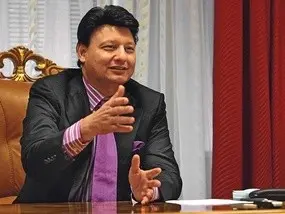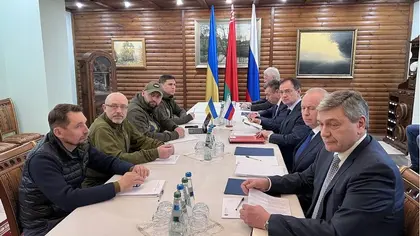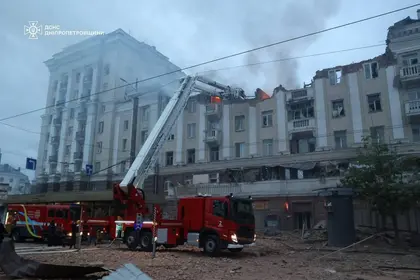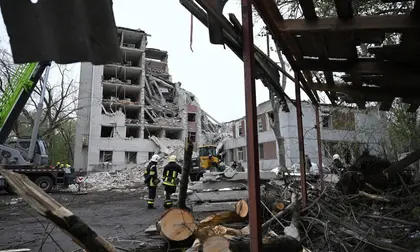Listening to Mohammad Zahoor tell his story, moving to Ukraine and becoming one of its richest businessmen sounds easy: All you need to do is get a good education, learn Russian, be in the right place at the right time and have some luck.
Of course, nothing is that easy. And it certainly wasn’t simple in Ukraine during its tumultuous transition from Soviet republic to independent nation in the 1990s.
Zahoor, the Kyiv Post’s new owner, acknowledges as much. “In this country, if you think that all of your business, whatever you are doing, will be a good experience, it’s an illusion,” he said in an interview.
Zahoor hasn’t forgotten the tough times, including, he said, the way that representatives of influential steel tycoons tried to wrest away a Donetsk steel mill from him in the mid-1990s, with one group succeeding in 2000.
Time and success seem to have smoothed over whatever hardships and hard feelings that Zahoor, 54, encountered on the way to a fortune he estimates at between $500 million and $1 billion.
Zahoor is a British citizen and a native of Pakistan. But if he were Ukrainian, his net worth would place him somewhere between the 4th and 14th richest citizens.
The mother lode of Zahoor’s financial empire came from a modern Donetsk steel mill he sold with prescient timing – at the peak of world steel prices in 2008. Not long after the sale, the global economic crisis hit, sending the prices of steel and almost everything else tumbling.
Flush with cash from his Donetsk transaction, today’s market is proving to be a great time for Zahoor, a married father of two adult children, to indulge in his other business interests. Many business owners entered the current recession in debt or cash-poor, and in need of liquidating assets.
The ISTIL Group he founded in 1991 has diversified interests, including such manufacturing companies as Aleana, which produces plastics. But Zahoor has turned most of his attention to buying up Ukrainian media and real estate assets. “These two [media and real estate] are our main fields of interest,” he said. “Real estate is doing really bad now, but it’s a good time to buy.”
The ISTIL (International Steel & Tube Industries, Ltd.) Group estimates its 2009 investments in Ukraine will reach $110 million. Zahoor works from his corporate offices at 33 Shevchenko Boulevard on Victory Square.
What does he own?
His real estate holdings include:
The more than 100-year-old Leipzig Hotel near the Golden Gate landmark in Kyiv’s center. The five-story, 9,620 square-meter building is an architectural gem that has sat empty for more than a decade. Zahoor wants to return the hotel, mentioned in Mikhail Bulgakov’s novel “The White Guard,” to its former glory with a thoroughly modern renovation.
Rialto Business Center in Podol, not far from Petrivka metro stop. Reconstruction is under way in the 15,000 square meter building, which will feature the latest digital fiber optic communications technologies and the latest in energy-efficient heating and cooling.
Logistic Center near Borispol. Development of a 35,000 square meters Class A warehouse and office space is planned.
Rialto Business Centers in Donetsk and Odesa.
His media projects include:
ISTIL Studios, state-of-the-art studios for producing television programs and films, costing an estimated $15 million;
Poverkhnost Group. He is a shareholder in the group that is a satellite TV provider and owns leading sports channels in Ukraine, and which has partnerships to develop television channels in music and fashion.
Kyiv Post. Zahoor purchased Ukraine’s top English-language newspaper on July 28 for an estimated $1.1 million from its previous owner, American Jed Sunden, who started the publication in 1995. It ranks as one of his smallest investments.
Who is Zahoor?
Zahoor first came to Ukraine in 1974, when he was 19 years old. He fell in love with Ukraine right away and has now lived in the nation for so many years that he no longer feels like a foreigner.
He grew up in a large and well-to-do Pakistani family. His father, who died in 1985, had a high-ranking government position in his home state. His mother is still alive. He is the youngest of four brothers (one of whom has died) and two sisters.
Zahoor took advantage of a government scholarship to study metallurgy in the Soviet Union. Out of 60,000 applicants, only 40 of them were chosen.
“At the time, I didn’t know much about Soviet Russia or Ukraine,” he said. “We were told that we would be kept in a separate dormitory, have Muslim food and all the bare necessities.”
None of that happened. Instead, after a brief stay in Moscow, Zahoor got sent to study in Donetsk and ended up learning Russian quickly, living in student dormitories for six years and growing quite fond of Ukrainians.
“I think I fell in love right away and found the people to be very friendly, in total contrast to what we read in the books about Russia and Ukraine,” Zahoor said. “We heard about a lot of racism problems, but this was all missing in the old Soviet Union. I made a lot of friends.”
He married a Russian woman, Olga, in 1981 and they had two children: daughter Tania, now 27, and son Arman, now 20. (The couple divorced in 1999 and he married Natalia Shmarenkova in 2003.)
After his studies, Zahoor and his wife moved to his homeland where he got a five-year contract with Pakistan Steel. He eventually rose to head of production, planning and control, but he faced discrimination in his career advancement because of his Russian wife. He resigned, and took a job with a Pakistani company that did business in Russia. It was the start of Mikhail Gorbachev’s perestroika, which started to open up many business opportunities by the time he returned to Moscow on Jan. 4, 1987.
He worked for the Tabani Group of Companies from Karachi, popular in the former Soviet Union for their imported shirts. His job, however, was to start new businesses for the company, and he became involved in the spare parts supply business, as well as trading in steel, zinc, aluminum, medical equipment and computers.
With a Thai partner whom he met in the steel-trading business, he started Metalsrussia in 1991. It later became his ISTIL Group. He lived in Moscow continuously for 13 years, until 2000, although by 1996 he was heavily invested in Donetsk steel and his experience was in high demand regionally.
“They were producing steel, but had no marketing experience of what to do with it,” Zahoor said. “Before, in Soviet days, they had a planning commission in Moscow which told them who to send that much quantity to – this factory, country, etc. My experience in Pakistan Steel gave me unique experience.”
He helped steel mills in several nations improve their product and learn how to transport the finished material to its destination without damaging it. He began to have success. “It was luck, of course, being at the right place at the right time, and my strong knowledge of the market,” he said.
He bought the Donetsk Metallurgical Steel Mill “without any resistance or competition. It was dying. It had about $150 million worth of debts. Nobody was willing to take it over. We participated in the tender. We were the only one. And so we got it and we had to make our investments in two years time.”
Suddenly, however, interest grew in the newly successful steel mill. Zahoor soon found that local Ukrainians – including some he understood to represent the current Industrial Union of Donbass – “wanted to get our mill.”
Oleksandr Pilipenko, vice president of the Industrial Union of Donbass, said his steel group was never involved in an unfriendly takeover attempt of Zahoor’s mill.
“It’s a big untruth,” Pilipenko said. “I was working for Zahoor that time. There were propositions to sell, no more. If somebody would like to take out the mill or to do something with him, then this was easy in those times.”
Whatever happened then, the nation’s richest businessmen – including Rinat Akhmetov, Oleg Mkrtchian and Serhiy Taruta, among them – emerged from the wild and violent 1990s privatization era with control of many of Ukraine’s most valuable steel plants.
Zahoor said he was never directly threatened with violence during the takeover attempt. “It wasn’t like someone came after us with pistols and guns,” he said. “They just came and said: ‘There was a meeting. We decided we are taking over ISTIL.’ You can’t use guns against guns. Sometimes you have to use your guts, diplomacy and senses.”
Zahoor said his business disputes in Donetsk taught him the value of an independent news media in exposing conflicts.
“We were always quite vocal all the time, calling for transparency,” Zahoor said. “Everyone in Kyiv the embassies and chambers of commerce, knew us. We used them to defend our interests also. At the end of the day, the people in Kyiv – in the government positions – did care. When they found out that something was going on, and was noticed by the Western media and diplomats, they tried to calm it down somehow.”
While Zahoor lost the big mill in 2000, he kept one Donetsk steel mill that he upgraded with the latest technologies that were less polluting and more energy efficient.
Zahoor invested $150 million into the plant. This mill is part of the steel business that he sold in 2008 for a price estimated to be more than $500 million, providing him with much of his working capital today.
The sale was perfectly timed, coming at the peak of world steel prices. Zahoor said he didn’t see today’s economic crisis coming, but predicted that steel prices would fall.
“I am a specialist in steel and saw that something bad was going to happen in steel. I saw China building up their steel capacities and consuming massive amounts of steel ahead of the 2008 Olympic Games, with all the construction work on infrastructure, etc. I saw that once the Olympic Games passed that China would have more capacity to export than import. And with their latest technologies, I saw that they were ready to kill everybody in their way that was small. And we were small. That was the time I started to think about selling my steel business. But to say I saw the crisis coming is not true. I didn’t see it.”
What’s the plan?
The future shape of Zahoor’s media and real estate holdings is still unclear.
His plans for ISTIL Studios suffered a setback when he had an acrimonious breakup this summer with Savik Shuster, the popular TV political talk show host and one of Ukraine’s few journalistic superstars.
The dispute is still raw. Zahoor said he hasn’t spoken to Shuster in a month. Zahoor said that he gave Shuster an option to own 25 percent of the studio “if he works for us for a certain amount of years and lends his brands to us and, once he leaves us, he should not be competing with us for several years.”
Zahoor said that Shuster never signed an agreement. “Almost a year passed, and everything remained unsigned,” Zahoor said. “When we pushed him to sign, we found resistance from his side. Also we had an agreement with Shuster that he would use that studio for other projects, maximizing its use. But none of this was ever done. So we started looking for our own formats, and started talking with other channels. We found that a lot of channels [including two channels where Shuster previously aired his show but departed] would not work with us if we were called Savik Shuster Studios. So we changed the name of the studio to ISTIL Studios. We believe that this studio can make much more money than it was making. That was the reason why we let Savik go so easily.
Shuster has a different version of events. “I came in as a partner, built the best studio in all of the former Soviet Union. Outside of the salary I got, I am coming out with almost nothing…I don’t think that I deceived anyone. At the end, he has the studio. He got all the advertising revenue, I just had a salary. My team is now setting up a new studio.”
While the Shuster dealings turned out to be a bad experience, Zahoor said he remains excited about becoming more involved in media.
“Media for me is a kind of self-defense. In the past, when we had troubles in our steel business, we did not go begging for help from politicians, presidents and prime ministers,” Zahoor said. “We want to do business on a level ground. A free media is something that can guarantee your survival. If someone is trying to ruin you, this is something you can use against him or her [with objective reporting].”
His wealth has allowed him to acquire big media assets, as well as a smaller one – the Kyiv Post. He said he bought the English-language newspaper for personal reasons as much as business ones. He’s read and liked the newspaper since it started in 1995.
“Way back in the old days, in Kyiv, when you stopped into one of the few decent restaurants, like Arizona BBQ, there was one newspaper you would pick up. It was the Kyiv Post,” Zahoor recalled. “Although it is tiny, it has a huge brand. And it is still the newspaper that every expat reads in this country. Also, the Kyiv Post website is the one which is most frequently visited by people who closely follow Ukraine from the outside, such as decision-makers.
“I like the newspaper. It was better in the early days,” he said. “Of course, the crisis has done its job. But we will be able to bring it back to its previous glamour and glory. And we are not thinking that this newspaper is going to be a money-[printing] press for us. The only thing we want is for people who read the Kyiv Post to get the correct picture of Ukraine, not a rosy one. There are a lot of wrong things going on in Ukraine. As an investor in this country, I feel obliged that we should bring to other investors the real picture of Ukraine.”
Zahoor said he doesn’t plan to compete with Russian-language print media because the market is already flooded with Russian-language newspapers. He may introduce a Russian-language online version of some of the Kyiv Post’s content, so that a wider audience can benefit. If his highest hopes come true, the Kyiv Post will become an integral part of his broader media holdings, providing independent and investigative journalism that gets used on TV programs and in other formats.
“In the past, I have read some good investigative reporting,” Zahoor said. “Let me be clear: We are not going to interfere in the business of the Kyiv Post. We want it to be an independent and objective voice, for the editors and journalists to tell the story how they see it – be it good or bad. If the paper finds itself under pressure for its fair and objective reporting, be it threats or lawsuits, we will back up the paper.”
As for his real estate interests, Zahoor is most excited by hotel projects. “With the Euro 2012 soccer championship coming up, the hotel development business is quite exciting. About a month ago, we acquired the still-unfinished Leipzig Hotel on the corner of Volodymyrska and Prorizna streets. We also have the Kinopanorama building on Shota Rustaveli Street. We want to develop that. There will be a small cinema theater, restaurants and karaoke.”
What does he want?
Zahoor said he’s always made it a point not to get cozy with politicians — and he will stick to that policy in his media holdings and other business interests. “I don’t try to be close to any politicians, because I really don’t see any positive things coming out of it,” he said. “Somehow, it creates more corruption and things like that.”
Sometimes he thinks that Ukrainians are making progress, while other times he thinks “they are falling apart” in building their nation.
“Right now, I think that nobody in the echelon of power has any interest in helping Ukraine. They are all working for themselves, trying to win the presidential elections or get the big business deal, and putting the countries’ interests aside,” Zahoor said. “Nobody is looking or putting effort into what is best for the country. I think the worst problem this country is facing is corruption. It is something that has grown into a cancer that has to be treated.”
“I don’t see anybody on top, no leaders, who really care about Ukraine or who want to make a difference,” he said. “But even if such a person shows up, even if it’s the ‘golden boy,’ I am not going to join his party or finance him. But, of course, I will say good things about such a person if he is really doing a good job.
“I’m not talking about a single person, but a team leader with a dedicated team, willing to change the system. You know what I am talking about: Fixing the institutions, the courts, removing corruption, the whole package. There is room for a lot of improvement.”
You can also highlight the text and press Ctrl + Enter







Comments (0)